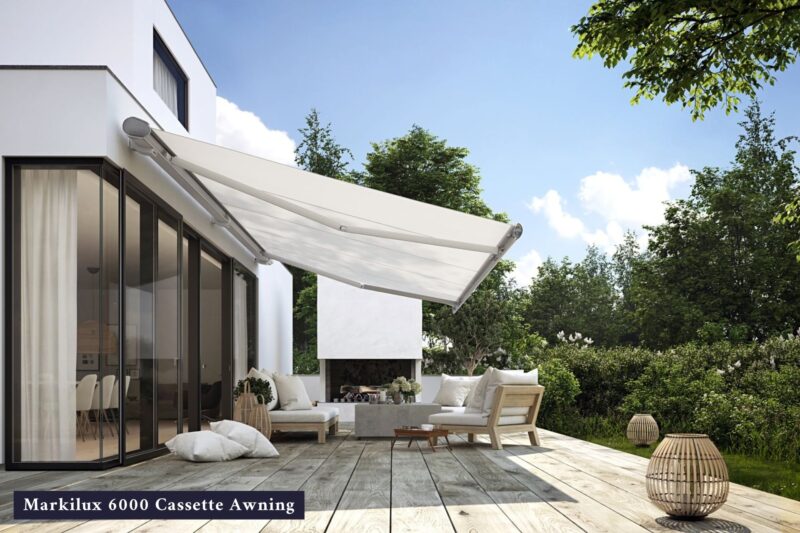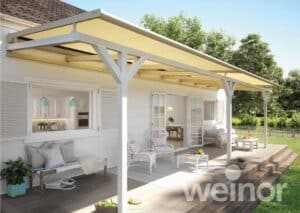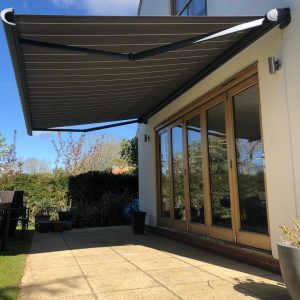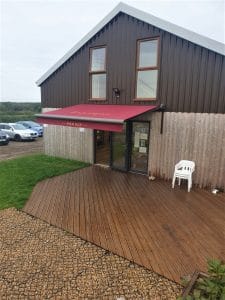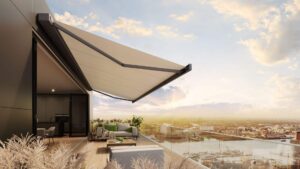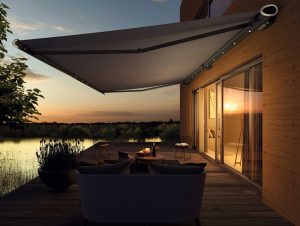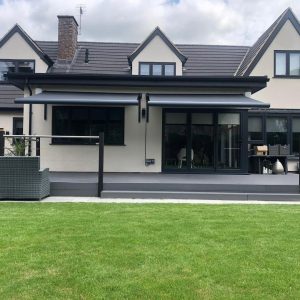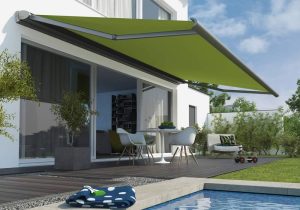The Benefits of Having an Awning
Awnings have become an increasingly popular addition to homes and businesses, providing not only aesthetic appeal but also practical benefits. Whether you’re looking to enhance your outdoor living space, improve energy efficiency, or add value to your property, awnings offer a versatile solution.
In this feature, we at Fraser James Blinds will help you to delve into the various types of awnings, their purposes, the materials they’re made from, their numerous benefits, and key considerations when choosing the perfect awning for your needs.
Types of Awnings
Awnings come in a variety of styles, each suited to different applications and preferences. Retractable awnings, for instance, can be extended or retracted as needed, offering flexibility and control over your outdoor space.
They are ideal for patios, decks, and windows, providing shade when you need it and retracting to let in sunlight. On the other hand, fixed awnings, also known as stationary awnings, are permanently attached to a building. They provide continuous protection from the elements and are commonly used over windows, doors, and storefronts.
Freestanding awnings are another option, not attached to any structure and can be moved around as needed. These are perfect for garden areas, poolside lounges, and outdoor events.
Additionally, portable awnings are lightweight and easy to set up, making them great for temporary needs like picnics, camping trips, or backyard parties.
Designed for Various Purposes
Awnings serve multiple purposes, making them a versatile addition to any property. One of the primary functions of an awning is to provide shade, making outdoor areas more comfortable during hot weather.
By blocking direct sunlight, awnings reduce the temperature beneath them, creating a cool and pleasant environment. This not only enhances comfort but also encourages the use of outdoor spaces for dining, entertaining, or relaxing.
In addition to providing shade, awnings can significantly improve energy efficiency. By blocking the sun’s rays from entering a building, they help maintain cooler indoor temperatures, reducing the need for air conditioning.
This leads to energy savings and lower utility bills, making awnings an environmentally friendly option. Furthermore, awnings offer protection from various elements, such as wind and harmful UV rays.
This helps prevent sun damage to furniture, flooring, and interior décor, preserving their appearance and longevity.
Aesthetically, awnings add a touch of elegance and style to buildings. With a wide range of colours, patterns, and designs available, they can enhance the visual appeal of any property. Whether you prefer a modern look or a more traditional design, there is an awning to suit your taste and complement your home’s architecture.
Materials Used in Awnings
Awnings are made from various materials, each offering unique benefits. Fabric is a common choice, with materials such as acrylic, polyester, and vinyl-coated polyester being popular options.
These fabrics are durable, resistant to fading, and available in numerous colours and patterns. They offer excellent UV protection and are often treated, making them suitable for different weather conditions.
Metal awnings, typically made from aluminium or steel, are known for their durability and strength. They require minimal maintenance and can withstand most harsh weather conditions. These awnings are also ideal for commercial buildings and industrial applications where robustness is essential.
Polycarbonate awnings are another option, known for being lightweight and highly durable. They provide excellent protection against UV rays and impact, often used in modern architectural designs and available in clear or tinted options.
Wooden awnings offer a natural and rustic look, perfect for blending with traditional or countryside settings. However, they require regular maintenance to prevent rot and weather damage.
Despite this, their aesthetic appeal and ability to blend seamlessly with natural surroundings make them a popular choice for many homeowners.
Benefits of Having an Awning
The advantages of installing an awning extend beyond mere aesthetics. Awnings create additional outdoor living areas, making patios, decks, and balconies usable even in hot weather.
This extends your usable space and enhances your lifestyle, providing more opportunities for outdoor activities and relaxation.
Energy savings are another significant benefit of awnings. By blocking the sun’s rays, awnings reduce the need for air conditioning, leading to significant energy savings. This is particularly beneficial in hot climates where cooling costs can be substantial.
Moreover, awnings protect windows, doors, and outdoor furniture from the elements, preventing fading and damage caused by prolonged exposure to sunlight and rain.
Awnings offer versatility and flexibility, especially with retractable options. This allows you to control when and where you need shade, adapting your outdoor space to different weather conditions and personal preferences.
Enhanced curb appeal is another benefit, as a well-chosen awning can enhance the exterior appearance of your home or business, adding charm and character. This can also increase property value and attract potential buyers.
Health benefits are also notable, as awnings provide shade that protects you and your family from harmful UV rays, reducing the risk of skin cancer and other sun-related health issues. By creating a shaded area, awnings encourage outdoor activities while ensuring safety and comfort.
Considerations Before Choosing an Awning
When selecting an awning, there are several factors to consider to ensure you make the right choice. First, determine the primary purpose of the awning. Is it for shade, wind protection, or aesthetic enhancement? Your needs will influence the type and material of the awning.
Consider where the awning will be installed. Different locations may require different types of awnings, such as retractable for patios or fixed for windows. Your local climate also plays a significant role in the type of awning you should choose.
For instance, fabric awnings may be ideal for mild climates, while metal or polycarbonate awnings are better suited for areas with heavy rain or strong winds.
The size of the awning should match the area you want to cover, and the style should complement the architecture of your property. Consider the maintenance requirements of the awning material as well. Fabric awnings may need regular cleaning, while metal awnings require less upkeep.
Finally, determine your budget beforehand and choose an awning that offers the best value for your investment. Awnings come in a range of prices, depending on the material, size, and features.
By considering these factors, you can make an informed decision that meets your needs and enhances your property accordingly.
Conclusion
Awnings offer a multitude of benefits, from enhancing outdoor comfort and reducing energy costs to protecting property and improving aesthetics. With various types and materials to choose from, there is an awning to suit every need and preference.
By considering your specific requirements and the factors mentioned above, you can select the perfect awning to enjoy its many advantages for years to come.
Should you require any help choosing the awning that is best for you, our friendly, yet professional team at Fraser James Blinds is always happy to help. Simply give us a call or alternatively, you can arrange a home visit at a time that works best for you.

